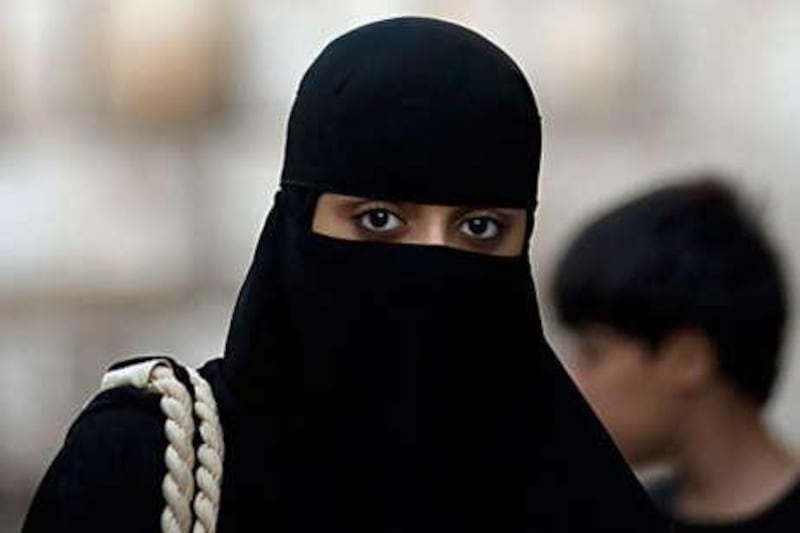DAMASCUS // Teachers who wear a full face veil have been quietly barred from their jobs by the Syrian government in a move the authorities say is necessary to protect secularism and ensure children receive an objective education.
Civil society organisations believe that 1,200 women have been affected by the measure, with all of them moved from their teaching positions and given jobs in local municipal authority offices. The ban does not affect teachers wearing the hijab, the headscarves favoured by the overwhelming majority of Muslim women in Syria, covering the hair and neck but not the face. The niqab, a full veil that only shows the wearer's eyes, if that, is largely confined to a conservative minority in Syria.
No formal public announcement on the ban has been made and details have been slow to emerge. Reports of the decision began circulating two months ago, when a number of teachers wearing the niqab complained they had been forced out of work. It took civil society advocacy groups a month to determine that the ministry of education had issued a verbal directive barring niqab-wearing teachers from work.
Until today, there has been no written declaration on the measure. The only official confirmation that it has taken place came in remarks made by the education minister, Ali Saad, on June 27. In response to queries made during a teachers' syndicate meeting, chaired by a member of the ruling Ba'ath Party, Mr Saad said: "Education in Syrian schools follows an objective, secular methodology and this is undermined by wearing the face veil."
He indicated that he expected other government ministries to follow suit in the near future. Public discussion of the issue has been all but non-existent. Mr Saad was notably not questioned on the matter when he appeared before parliament last week following the teachers' syndicate meeting. Information collected by independent civil society groups suggests that half the affected teachers were from the northern Syrian governorate of Aleppo, widely considered to be a more religiously conservative city than the capital, Damascus. The niqab is a comparatively common sight on the streets of Aleppo.
The remaining 600 banned teachers were from Damascus governorate, Latakia and the three Jazeera provinces, Raqqa, Deir Ezzor and Hasakah. It is understood that some had taught for decades. Civil society researchers believe that all the niqab-wearing teachers were primary school staff, or had only taught classes of girls, meaning that none actually wore the veil during lessons. According to Islamic tradition, women only cover their hair in the presence of adult males who are not family members.
Teachers would therefore wear the veil while travelling to and from work, but would only wear it on school property if accompanied by male members of staff. In the absence of public debate, it is unclear how much support exists for the move in society at large. Civil society organisations - most of them secular - have by and large welcomed the step, interpreting the subdued reaction as evidence of its popularity. However, they acknowledge that, with political dissidents frequently jailed in Syria for speaking out against the government, those opposed to the ban may be erring on the side of caution.
Bassam Kadi, director of the Syrian Women Observatory, said some of the teachers had approached his women's rights group, asking it to lobby on their behalf. "They said the government is being unfair and undermining their rights," he said. "They also argued they had never worn the niqab in school, that they did not allow their veil to affect the quality of their teaching and that they had not been given a chance to change their mind and just wear the hijab before they were moved."
The syndicate declined to take on the teachers' case, and Mr Kadi supported the ban. "The niqab is not a Syrian tradition. It's an imported symbol of religious extremism and contradicts the moderate Islam we know here," he said. "If a woman wears the hijab, that is her choice and her right. "If she wears niqab, she is forcing an attitude on society. She is making a statement. That is not acceptable in a school."
Underlining his backing for the ban, Mr Kadi wrote a controversial article comparing niqab-wearers to nudists. If some teachers are to be allowed to cover their faces in public, then others should be free to wear no clothes at all, he suggested. Since publication, he has been bombarded with abusive e-mails. Ammar Qurabi, of the National Organisation of Human Rights, another secular and independent civil society group, said the ban was wrong in principle. "Secularism to me means tolerance," he said. "Banning teachers because they wear the niqab outside the classroom contradicts that idea.
"Secularism should safeguard your right to wear what you want. It's about personal freedoms." If the authorities considered the niqab a sign of religious extremism, they ought to address the underlying issues, rather than ban women from working in the classroom, he argued. "There are also practical questions here: were these women good teachers, and can we afford to lose them? "Do we have proper replacements? Do the municipal government offices need 1,200 new and unqualified staff?
"It all points to the chaotic way that the government so often makes decisions." psands@thenational.ae





